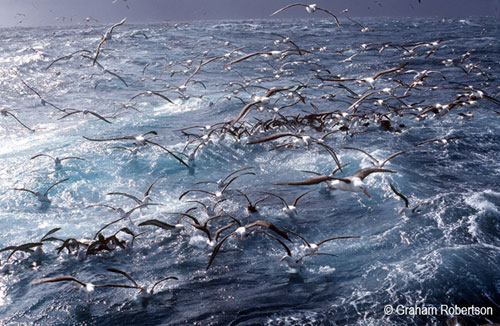José Pedro Granadeiro (CESAM and Department of Biology, Universidade de Aveiro, Portugal) and colleagues, writing in the journal Animal Conservation, have deduced that Black-browed Albatrosses Thalassarche melanophris do not specialize as scavengers from ships, meaning that the whole population is at risk of fishery-induced mortality.
The paper’s abstract follows:
“Fisheries can have profound impacts on the structure and functioning of marine ecosystems and affect seabird populations. For seabirds, impacts can include direct mortality in fishing gear, but fisheries also represent an abundant source of food that may otherwise be inaccessible. Previous studies with seabirds have revealed the occurrence of individual foraging specializations, and therefore in scavenging species some individuals may have a higher propensity to feed on fisheries discharges than the rest of the population. Here we used recently developed techniques (spatio-temporal match of positions) to detect interactions between black-browed albatrosses Thalassarche melanophris and fishing vessels, and also stable isotope analysis of tissues with different turnovers, to investigate long-term individual specialization in fishery waste products. We combined global positioning system tracking data from 89 birds with vessel monitoring system data from the entire fleet operating around the Falklands Islands, in 2009 and 2011. Interactions with vessels (freezer/factory bottom trawlers) occurred in 15 out of 89 independent albatross trips. Among individuals tracked in both years, those that associated with fisheries in 2009 were not more likely to do so again in 2011. Carbon and nitrogen isotopic signatures in whole blood and feathers of albatrosses that interacted with trawlers were similar to those of individuals that did not. Also, we found no correlation between feather and blood isotopic ratios of carbon or nitrogen, indicating no long-term consistency in the isotopic niche of study birds. These results suggest no specialization of individual albatrosses with regard to fisheries. Studies of other albatrosses have also failed to show long-term trophic consistency, which may indicate that scavenging albatrosses, a group particularly threatened by fisheries activity, do not specialize in discards. Therefore, any management actions leading to a reduction of discards will be beneficial, decreasing the numbers of birds behind vessels and consequently the likelihood of incidental mortality.”

Black-browed Albatrosses gather behind a fishing vessel
Photograph by Graham Robertson
Reference:
Granadeiro, J.P., Brickle, P. & Catry, P. 2013. Do individual seabirds specialize in fisheries’ waste? The case of black-browed albatrosses foraging over the Patagonian Shelf. Animal Conservation doi:10.1111/acv.12050.
With thanks to Barry Baker for information.
John Cooper, ACAP Information Officer, 23 June 2013

 English
English  Français
Français  Español
Español